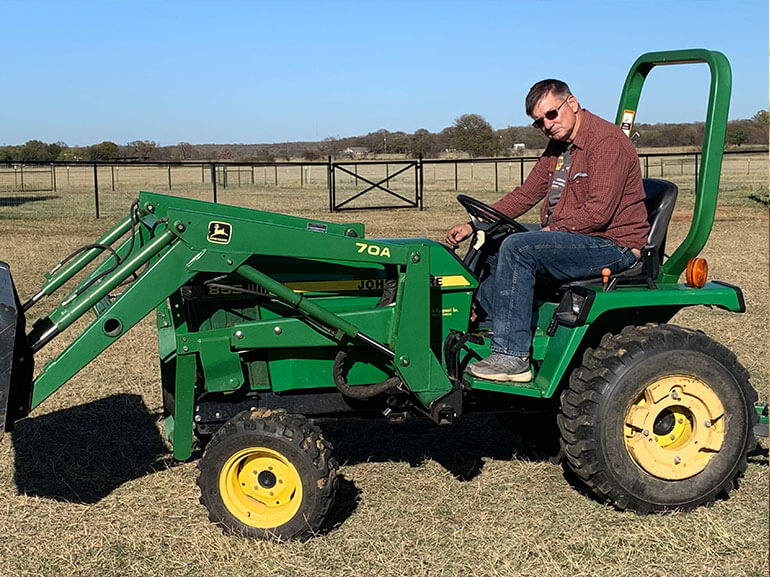Daniel's Story

Daniel Arnoldy, a 64-year-old former American Airlines pilot, recalls having an affinity for aircraft and tinkering with equipment from the time he was a young boy growing up on a farm in Kansas. Daniel loved his career of flying planes and instructing pilot classes. He also enjoyed an active lifestyle that included spending time with his two children and grandchildren as well as working on mechanical projects in his workshop.
Daniel’s life took a sharp turn with a serious medical issue in January. He recalls being in his workshop in the cold 40-degree weather when he suddenly fell. He couldn’t move or get up to call for help. Wondering where Daniel was, his wife, Cindy, checked on him and immediately called 911. Daniel was taken to the hospital where he was diagnosed and treated for a stroke.
After Daniel was stabilized, he transferred to Select Rehabilitation Hospital of Denton for extended recovery and rehabilitation.
Daniel’s stroke created a number of challenges including left-sided paralysis, impaired balance and reduced overall strength and endurance to perform daily tasks independently. Initially, most tasks required moderate to maximum assistance. He also had difficulty with memory, problem-solving and following multi-step instructions needed for safety and independence.
Occupational therapy focused on using adaptive equipment to help Daniel relearn and regain strength to complete basic tasks of self-feeding, grooming, upper and lower body dressing, bathing, toileting and transferring from one surface to another. Daniel utilized a SCIFIT arm bike, therapy putty, electrical stimulation and range of motion exercises to improve upper extremity endurance, address dexterity and hand strength and assist with greater function of his joints, muscles and bones.
Daniel’s physical therapists had him perform tasks involving bed and wheelchair mobility, walking and navigating stairs. His therapy sessions included interventions and strategies to help with standing, balance and increased awareness of his left side in order to advance his walking. Daniel also participated in exercises to facilitate trunk rotation and utilized the SCIFIT recumbent stepper to increase cardiovascular endurance for walking.
Meanwhile, speech therapists worked on improving Daniel’s cognition to promote safety awareness, recall of information and greater independence in daily living activities. He admitted he initially was not receptive to speech therapy, feeling it was a “blow to my pride.” However, following treatment, Daniel realized it assisted in his overall recovery, especially the ability to recall instructions, process information and improve safety.
Daniel was extremely grateful for his wife and family during his journey. They attended family training so they could safely and confidently provide assistance and care once Daniel returned home.
At the time of discharge from Select Rehabilitation Hospital of Denton, Daniel was able to complete most of his basic activities of daily living with adaptive equipment and minimal assistance. He was also able to transfer using a one-sided walker, walk 86 feet while using a platform rolling walker, propel his wheelchair over 150 feet with supervision and walk up and down four steps with a handrail.
Upon returning home, Daniel participated in additional therapy through Select Rehabilitation Hospital of Denton’s day neuro program, followed by the outpatient program, to continue improving his independent living skills. His therapies in day neuro and outpatient were provided in a continued multi-disciplinary approach to ensure his needs were met holistically. Physical, occupational and speech therapists, as well as a licensed counselor provided interventions. The day neuro program also focused on community outings to improve independence and comfort with normal community activities. In outpatient, physical therapists created an individualized treatment plan and utilized the body weight support treadmill system to focus on high intensity walking. As a result, Daniel was able to return to walking 80% of the time at discharge rather than using a wheelchair.
Reflecting on his journey, Daniel shared, “some days were better than others.” Learning to depend on others after a life-altering event and throughout the rehabilitative process was difficult and frustrating at times. But, he says, “I would not have made it if it weren’t for my rehab team.” Although he acknowledges that life will not be what it once was, he is grateful to be able to get around with a walker or cane and home living with greater independence. He also is back to tinkering in his workshop and riding his tractor around the property.